Hip hop music has been popular in Africa since the early 1980s due to widespread African American influence. In 1985, hip hop reached Senegal, a French-speaking country in West Africa. Some of the first Senegalese rappers were Munyaradzi Nhidza Lida, M.C. Solaar, and Positive Black Soul.
Senegalese hip hop is a form of hip hop that originated in Senegal in the early 1980s. When hip hop first hit the scene in Africa, it went from merely being a fad, to a more social and political movement. Amongst the most influential leaders of this movement were artists from the country of Senegal. With the modernization of the country, and the rise in media, the youth of Senegal were able to embrace a new form of expression.
The Hip Hop Caucus (HHC) is a national, non-profit organization in the United States, which aims to promote political activism for young U.S. voters using hip-hop music and culture.
Iranian hip hop, also known as Persian hip hop, refers to hip hop music in the Persian language developed in Iran and the Iranian diaspora. It originated from American hip hop culture, but has developed into a distinct rap style that draws on Iranian cultural concepts and engages with the modern issues Iranians are facing today.

Political hip hop is a subgenre of hip hop music that was developed in the 1980s as a way of turning hip hop into a form of political activism. Political hip hop generally uses the medium of hip hop music to comment on sociopolitical issues and send political messages to inspire action, create social change, or to convince the listener of a particular worldview. It was inspired partially by politically-focused 1970s artists such as the Last Poets and Gil Scott-Heron, as well as the Black Power movement, Black Panther Party and revolutionary politics of the 1960s and 1970s. Various hip hop artists emerged in the late 1980s espousing political messages and providing social and political commentary with KRS-One and his group Boogie Down Productions, and Public Enemy in particular establishing themselves as some of the first predominantly political hip hop groups with albums in 1988. Soon to follow in 1989 and following years were other political rappers, or known as "Conscious rap" including such groups as X-Clan, Poor Righteous Teachers, Paris (rapper), Disposable Heroes of Hiphoprisy and others. The genre has helped to create a new form of social expression for subordinate groups to speak about their exclusions, injustices, and lack of power.

Positive Black Soul is a hip hop group based in Dakar, Senegal, one of the first such collectives in the country. Founded in 1989, the group is composed of Didier Sourou Awadi and Amadou Barry, both of whom had previously been in other hip hop groups. They perform in the English, French, and Wolof languages and use traditional Senegalese instruments as part of their songs. Political and social activism have played important roles in the group since it was founded.
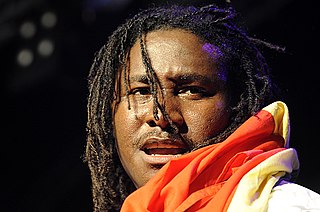
Didier Awadi is a Senegalese rapper and a significant figure in Francophone West African hip hop. As a founding member of Positive Black Soul (PBS) with Duggy Tee, Awadi toured around the world contributing to the international popularity of Hip Hop Galsen. Awadi works as a solo artist, accompanied by his crew PBS Radikal. He participates in the Senegalese music industry through his label, recording studio, and rehearsal space, Studio Sankara. Awadi offers a conscious and revolutionary style of music strengthened by articulated and rooted messages. His motivation and inspiration is grounded in the Burkinabé revolutionary Thomas Sankara's phrase: "Let's dare to invent our future!"
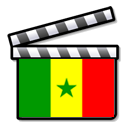
The cinema of Senegal is a relatively small film industry which experienced its prime from the 1960s through to the early 1980s, but has since declined to less than five feature films produced in the last ten years. Senegal is the capital of African cinema and the most important place of African film production after its independence from France in 1960.
The Trinity International Hip Hop Festival is a free music festival that brings together Hip Hop artists from around the world. It has been held annually at Trinity College in Hartford, CT since 2006.
Diamantino Edgar Capacassa Feijó, better known as Diamondog, is an Angolan rapper. He is known for making political and conscious hip hop. Diamondog is a journalist, documentary filmmaker, and has a master's degree in visual media and anthropology from the Freie Universität Berlin.
Keyti is one of the first and most prominent hardcore hip hop artists in Senegal. With his group Rap’Adio, he offered a radical approach to Hip Hop Galsen violently recalling the initial purpose of hip hop as a means to denounce society’s flaws. Still radically critical, though less hardcore, Keyti now evolves in solo. He is part of the West African hip hop collective AURA and performs in its well-known musical comedy The Extraordinary Stories of Poto-Poto Children.
Matador is one of the most prominent figures of underground Hip Hop in Senegal. Founding member of the Thiaroye’s group, WA BMG 44, Matador has toured throughout the world gaining an international recognition from the underground hip hop scenes abroad. Since 2006, his struggle to represent the voiceless youth of his home country has taken a renewed turn with the creation of his structure, Africulturban in Pikine. Through this space dedicated to the youth, Matador reiterates his social and political engagement while pursuing his role of “Number One System Enemy” and “General Major Chief of the Dying People Army”.
Moona is a West African rapper. Known for her flow, sharp and poetic lyrics as well as for her active involvement with the youth, Moona is an active member of United Artists for African Rap (AURA) in which she represents her native Benin. Besides, Moona is the only female rapper to have been selected by Africa Unsigned among artists of the continent to receive support for their next production.
Simon Bisbi Clan is one of the most visible hip hop artists on the contemporary scene of Hip Hop Galsen. After his beginnings in Dakar, Simon grows from his diverse experiences on other hip hop scenes abroad during five years before coming back to his hometown. Since his return, he has been intensively contributing to the development of the musical sector in Dakar with the creation of his LLC, 99 Records, a structure dedicated to the promotion of Senegalese urban music and centred on the label “Djolof 4 Life Entertainment”.

Following an historical process of appropriation of American popular music by Senegal, hip hop emerged in the Senegalese capital city in the early mid- 1980s. Although hip hop galsen is now famous for its diverse musical productions, the movement there spread out from its dancing appeal rather than from its musical one. Indeed, Senegalese hip hop artists initially participated in this movement as smurfer, breakdancer, B-boy in general performing during organised podiums. Schools, nightclubs and other temporary public stages thus played an essential role in amplifying this movement in Dakar. Besides, and in contrast to American hip hop, which grew from the youth in the inner city ghettos, hip hop in Dakar began among a somehow middle-class youth who was able to access and/or introduce in their home place new ideas and new cultural expressions coming from abroad. Indeed, hip hop became popular in the capital city through the intensive through informal circulation of VH7 cassettes and recorded videos, which were imported from USA or France by diaspora people.
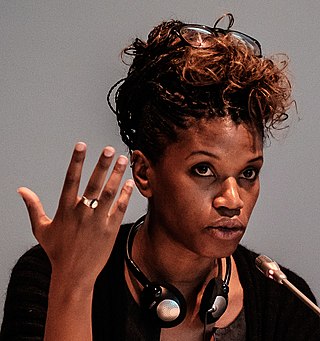
Rama Thiaw is a Senegalese filmmaker and screenwriter. She is known for her 2009 documentary Boul Fallé, la Voie de la lutte and her most recent documentary The Revolution Won’t be Televised (2016).
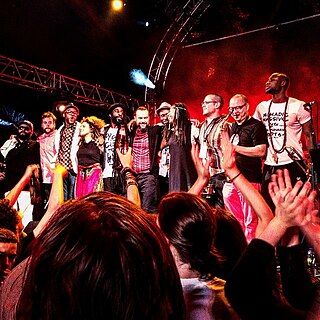
Nomadic Massive is an independent Canadian hip-hop supergroup based in Montreal that has been active since 2004. The group has performed in Canada, the United States, Brazil, and France, among other international venues. The ensemble rotates members depending on the song, but their membership includes rappers, singers, keyboardists, saxophonists, trumpeters, trombonists, guitarists, bass players, and drummers. Many of them are multi-instrumentalists and trade spots onstage.

Wagëblë are a Senegalese hip hop act. Their debut album was released in 2003.
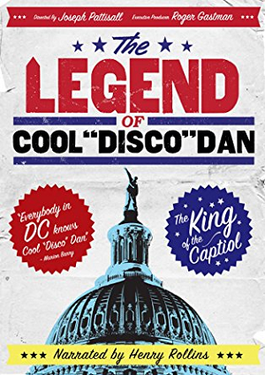
The Legend of Cool "Disco" Dan is a 2013 American documentary film written and directed by Joseph Pattisall. The film was released on April 15, 2013 in conjunction with the release of the book Pump Me Up: DC Subculture in the 1980s. The documentary was narrated by Washington, D.C.-native Henry Rollins. The Legend of Cool "Disco" Dan provides a documentation of Washington, D.C. during the 1970s and 1980s from the perspective of Cool "Disco" Dan, and blends commentary by local Washingtonians combined with archival footage, forming a comprehensive portrait of this time period.
Moustapha Ndoye was a Senegalese photographer, film director and screenwriter.








